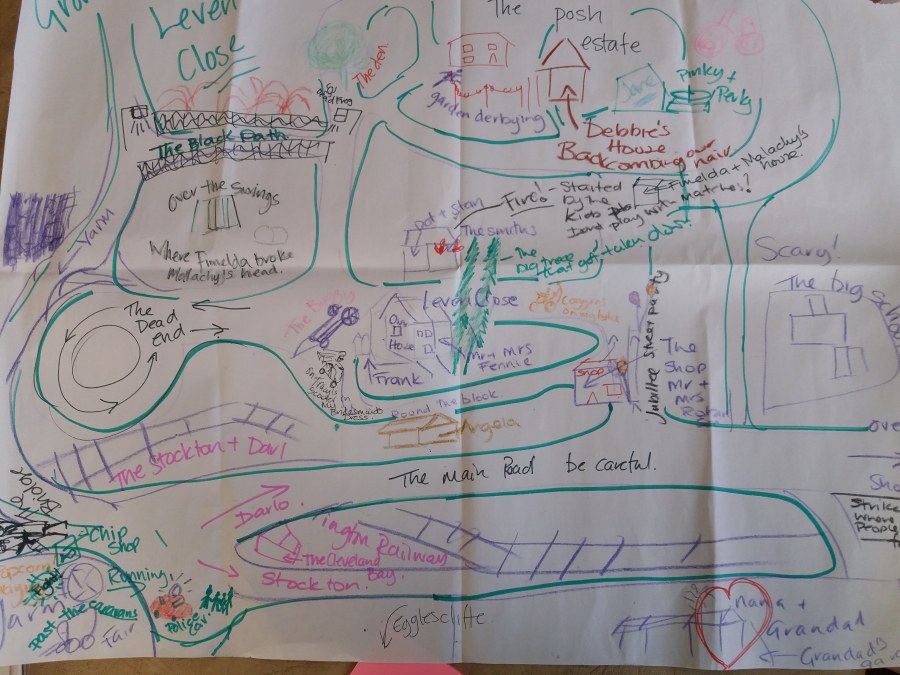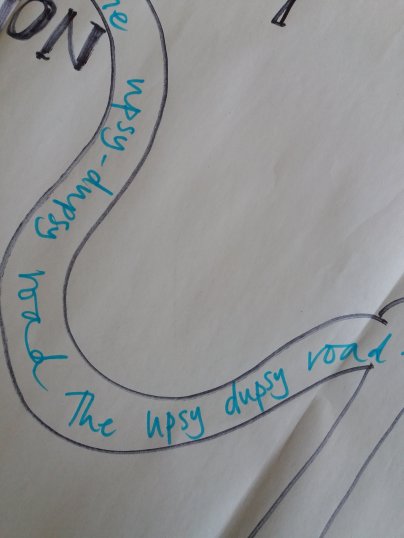Being the tale of how Scrooge finally realised he really had reformed.
Of the lost – which is to say abandoned – stations on the London underground, it is Scrooge Street which is perhaps the most likely to be haunted, if you believe in these things. It lies on a disused offshoot of the City branch of the Northern Line, which was built to serve the vast numbers of workers at the house of Scrooge and Marley, which prospered far more after Scrooge’s repentance of his miserly ways, than it ever did before it. (Dickens naturally missed this part of the story out, Christmas being no time for emphasising the materially enriching possibilities of goodness).
Eventually the firm was obliged to build new offices elsewhere, and the old premises were knocked down. In their place, Scrooge built a row of neat and comfortable houses; one for himself, another for his clerk Bob Cratchit, and the rest given to long-standing employees who had served the firm in the early years of its great expansion.
In more recent times, the land on which the street stands has been much coveted by property developers, who have been prepared to offer vast sums of money for the plot, but those who live there now are protected by the provision in Scrooge’s will, that the road through it must be named after himself in perpetuity; and the authorities in the City, mindful also of the tourist trade, have refused to consider any challenge to this. Since no bank or other financial institution would (so to speak) be seen dead with a head office in Scrooge Street, the immunity from upheaval the inhabitants enjoy is complete.
Immediately next to the covered-up top of the lift shaft at the station (there was never an escalator) a small patch of land was for many years, Scrooge’s garden. In his miserly days he had sown it with oats for his porridge, and paid his clerk Bob to reap the grain with a pair of office scissors; these were then crushed in small batches (by Bob again) in the office’s copying press, and after several days’ gruelling labour (gruel being the operative word) enough porridge oats resulted to provide Scrooge with about a week’s worth of breakfasts (hot) and suppers (cold). It was the reformed Scrooge’s decision to cultivate something else, such as sunflowers and pansies and wallflowers and grass for the children in his newly-acquired or rather newly-recognised extended family to enjoy and play in. It was indeed in the release of Bob Cratchit to more conventional clerical activities, that his business genius first found its way into practice, the rapid growth of Scrooge and Marley thereafter owing a great deal to this.
One winter’s day Scrooge’s nephew’s oldest boy – aged ten or eleven – an active, practical lad named Tom, deciding to plant a sunflower seed the following spring, and, dibbing a small hole on an exploratory basis, found an unexpected resistance in the earth, and, enlarging the hole, discovered a coin. He showed this to Scrooge, who saw at once that it was not a British coin with which he was familiar (and nobody was more familiar with British coins than he). Scrooge therefore took the boy with him to the British Museum, and the coin was identified as Roman.
“If we dig a hole,” Tom said excitedly, “we might find some more coins.”
“I’m not so sure about that,” Scrooge replied, not wanting to have anything to do with digging for treasure, since the activity – grubbing for money in the literal sense – was not a thing he wanted to encourage in the boy, and which he was by no means inclined to try himself – the activity reminding him of his shameful past.
There is nothing like the scepticism of an adult to encourage activity in a child, and it was therefore hardly surprising that about a week later, when Tom visited his father’s uncle again, and while Scrooge was busy baking a chocolate cake for their tea (such was his new-found domesticity) the lad abstracted a spade from the garden shed and set to work.
Nature in the form or wind, rain, earthworms and birds had already eroded the hole made by the dibber so much that only a small depression marked the place where the coin had lain buried. It was, however, just recognisable, and no sooner had the spade cut into the soil beside it than further resistance prevented it digging any deeper.
A few seconds later a veritable hoard of coins began to appear. Tom ran to Scrooge, who was just removing the cake from its tin.
The reformed Scrooge was far to amiable to be angry when the boy told him the news of his discovery, and undertook to examine the new find as soon as he had tested the cake with a knife. When the cake proved to be as easy to slice into as the earth in the garden had not been, he followed the boy as he eagerly scampered ahead.
The coins at the edge of the pile were somewhat scattered, and it took them some time, taking turns with the spade, to extract what seemed to be the last one. Dark had indeed begun to fall when that one was placed in the wheelbarrow along with the rest.
“I’ll have to go now, uncle,” said Tom. (He called Scrooge uncle, since ‘great-uncle’ was too much of a mouthful, especially when the mouth in question was usually full of things like chocolate cake in Scrooge’s presence).
Tom took another slice of cake and left.
Scrooge remembered that they had not put the spade away, and carefully made his way through the dark to where they had left it, just beside the hole.
As he carried the spade, still caked with earth, to the shed, it happened to pass through a shaft of light thrown by the kitchen window. (It goes without saying that the lights in Scrooge’s house were particularly bright nowadays.) And in that light, Scrooge saw a round shape protruding from the earth still attached to the spade. It was another coin.
As soon as Scrooge had abstracted it, he heard a loud moan, and, to his horror (the first horror he had felt since his reformation) he saw a bright but somehow sickly light emanating from the hole where the coins had been.
He had seen that light before; it was the ghastly light of the underworld, the light which had surrounded the first ghost he had seen on that unforgettable night, only a few years ago in fact, but which now seemed to him to be a lifetime away.
He was therefore not surprised when another, even louder, moan came from below. He was, however, deeply shocked and indeed horrified.
The same emotions he felt, only even more strongly, when a ghostly figure appeared from the hole, rising but with no apparent sense of liberation. Indeed, the figure seemed positively unwilling to elevate itself.
Although it had passed through a hole in the ground, Scrooge was not surprised to observe that its clothing was clean. He should not perhaps have been surprised that the clothing in this case was a toga, but he was nevertheless.
Scrooge’s previous experience of ghosts had been associated with a sense of guilt, but he felt no such pangs on this occasion, since the discovery of the coins had been by chance, and in the course of making his garden available to his great-nephew. In these circumstances, he thought himself justified in not making any enquiries of the ghost to begin with, and to wait for the man in the sickly, greenish, luminous toga to state whatever his business was first.
The silence was longer that Scrooge was comfortable with, but the spirit finally spoke.
“I am the ghost of Iacobus Marlius,” the spectre announced.
“Excuse me,” Scrooge began, “but you don’t much look like the Jacob Marley I knew.”
“I am not the Jacob Marley you knew,” the ghost replied. “I am Iacobus Marlius, the legendary Roman miser.”
“I’m sorry,” said Scrooge, “but I don’t know much about Roman legends.”
“Neither did I,” Marlius said miserably. “If I had, I would have learned about Midas for a start.”
Scrooge did know a little about Midas, for obvious reasons.
“I though Midas was a Greek,” he observed.
Marlius shrugged his shoulders. As he did so, the sickly green light coruscated so intensely that Scrooge felt nauseous as well as frightened.
“Greeks to us were like Romans are to you,” he explained.
Scrooge thought for a moment. Something concerned him, and he soon identified what it was.
“Are you saying that you were condemned to be a ghost because you found some buried Greek coins?”
Marlius burst out laughing, but his laughter could not have had less merriment in it. If laughter could be coloured, it was sickly-green with sarcasm. What with that, and the even more virulent coruscations of the toga which the laughter set in motion, it was all that Scrooge could do to hold his chocolate cake down.
“I’m a ghost because I was a miser,” he said. “They became so sick of me in Rome that they posted me to Britannia. It was either that or being handed over to the Vandals in exchange for the Emperor’s third cousin once removed whom they were holding as a prisoner. So I chose Britain. They asked me to set up a bank. Somebody thought Londinium had possibilities in that direction.”
“And did you?” Scrooge inquired.
The toga blazed green and yellow and worse in all directions.
“Yes and no. I found a building – very expensive to rent for its size, I might say – and I got a sign painted.”
Scrooge had lately taken an interest in art. “What was on it?” Scrooge inquired with curiosity.
Marlius shrugged his shoulders. Scrooge wished that he hadn’t.
“A bag of money. What else?”
“And what happened after that?” Scrooge asked.
Marlius took a deep breath. Scrooge was relieved that the toga barely moved as he did so.
“There was this woman.”
Scrooge resisted the temptation to say ‘there usually is’. He now regretted that he had never married, nor had children of his own, although there was a kindly widow ten doors up on the other side of his street about whom he was beginning to –
He turned his attention to Marlius once more.
“She was called Bodicea,” Marlius went on.
Scrooge’s knowledge of history was even more deficient than his knowledge of art.
“A nice name,” he said.
Marlius gave Scrooge a queer look.
“She wasn’t nice at all. She was one of your queens. Don’t you know that?”
Scrooge shook his head.
“She led a revolt against us in East Anglia, and then marched towards London. They thought she might drive us out. That’s why I buried these coins.”
“And why didn’t you dig them up again?” Scrooge asked.
“Because I was dead, that’s why. I was a nominated hostage, you see. They therefore took me to the front line in the battle, so if somebody important were captured, they could exchange me for them. And that’s what they did.”
“But why did they kill you?” Scrooge inquired.
“They weren’t intending to kill me at first. But then they asked me what I did, and rather than tell them I was a miser, which I thought might turn them against me, I told them I was a banker – which I wasn’t really, because I hadn’t banked anything at that stage. And as soon as I told them I was a banker, they set on me. I’ve since found out on Spookipedia that the British have always had a particular hatred of bankers.”
Scrooge had never heard of Spookipedia, and asked what it was.
“We have a thing called the internet,” Marius explained. “Spookipedia is an encyclopaedia. You do a few things with your computer, as we call it, and you can look anything up. It’s amazing what you learn. Did you know that there are some vampires who recoil from something called Marmite? And four out of five poltergeists self-harm at some stage? We also keep in touch; we can rattle our chains on a spectral network. It’s called Clinkedin. That’s how I got in touch with Jacob Marley. We’ve become great friends – not that we’ve ever actually met.”
Scrooge could not help asking what seemed to him an obvious question.
“How long would it take you to fly to see Marley in – if you don’t object to the phrase – in person?”
Marlius thought for a moment.
“About two seconds. Three at the most.”
Scrooge nodded.
And how fast is your – what do you call it – Internet connection?
The ghost considered.
“Shroudband speeds vary. Sometimes half a minute. Sometimes four or five minutes. I once had to try three times, and it took about ten. And sometimes it goes off altogether. Not that that bothers us. I mean, as you can see, this is quite a nice toga -”
Scrooge shuddered here.
“- I try to keep up appearances. But if you’d seen the average spectre – not to mention the ghouls – you’d realise that going off is part of our way of life.”
Scrooge remained silent because he did not know what to say. Then he thought of saying:
“Half a minute. Sometimes four or five?”
Marlius considered for a few seconds more than it would have taken him to fly to see Jacob Marley.
“Oh. “I see what you mean.”
Scrooge thought of his former partner.
“Hasn’t Marley said anything?”
The toga flickered stomach-churningly as Marlius shook his head.
“No.”
“What about anybody else?”
Marlius frowned. Scrooge was glad to see that he had at least stopped shaking his head.
“To tell the truth, he’s the only contact I keep in touch with. We seem to have a lot in common. Most of the others are only concerned with selling financial products. I suppose it’s my own fault for saying that I was a professional miser. Didn’t want to risk calling myself a banker again. They have these things called algorithms, whatever they are. The network, I mean. But, as I said, it can be slow. I suppose I could change my provider. I’ve heard Haunt Haunt is quite good…”
His voice tailed off.
“Why are you here?” Scrooge asked. “And if the idea doesn’t distress you too much – now?”
Marlius returned to both.
“Here because my coins were here. Now because you found my last one. On your spade there.”
“Do you want them?” Scrooge asked gently, and, he felt, almost needlessly since he was sure that the ghost’s interest in them was anything but pecuniary.
The spirit shook his head. Scrooge almost vomited, and made a mental note not to ask any further questions requiring ‘yes’ or ‘no’ as an answer.
“What use is money to me? And in any case our coins are ten a penny.”
Although that wasn’t what the man in the British Museum had told him, Scrooge said nothing. He nowadays felt that it was vulgar to talk about money, and that being the case, it would be even more vulgar to talk about money in relation to money.
“There must be Roman coins all over the place. Not in piles, I admit, but individually. Thousands and thousands of them. No civilisation in history, I tell you, has ever been, or ever will be, so careless with its small change. All due to our relative lack of inventiveness. I’m sorry to admit it, but it’s the truth. Spookipedia mentions this specifically.”
Scrooge was puzzled by this, and was gratified to see that Marlius appeared to have noticed, since he explained at once.
“Take the matter of numbers. Our numbers are, to put it kindly, all over the place.”
Despite his general ignorance of history, Scrooge knew Roman numbers perfectly well, these being displayed on (among many others) the clock in his office which he watched so closely before his repentance, not on his own account, but to see that Cratchit always arrived on time and never left early.
“Your numbers are still all over the place,” he said. Not only clocks, but public buildings and -”
Tombstones came to his mind, but he thought it best not to mention them, and fell silent.
“I bet they’re not in any place where you have to add them up,” Marlius observed sarcastically. He took a deep breath.
“And then there’s the pointed arch. Pretty obvious, you might think. But we never invented that. And can you see something else we didn’t invent?”
He rustled his toga, which almost caused Scrooge to faint.
“Is there something you can’t see?”
Apart from being unable to see the prospect of eating anything ever again, which he sensed was not the point, Scrooge could see nothing.
“Well,” Marlius explained. “Can’t you see that we never invented the pocket? That’s why we were always dropping coins all over the place.”
“I see,” Scrooge said. “Can you possibly explain something else to me?”
“Well, if I can,” Marlius said. “If I don’t know the answer, I’ll look it up on Spookipedia and I’ll be back tomorrow.”
“It’s not that sort of question,” Scrooge said hesitantly. “What I was wondering is – why are you here – apart from the fact that I found your last coin. Were you trying to tell me that, so that I won’t waste time looking for any more? If so, that’s very kind of you, but -”
He did not know how to finish.
Marius did not seem to know how to start. Scrooge could see that there was something, though. At length Marius spoke.
“I was trying to help you, yes. It’s not something I’ve ever done before. Jacob Marley recommended you. He thought that if I did something for you, then you might help me.”
He hesitated for a moment.
“And him.”
“Why didn’t Jacob come?” Scrooge asked.
“He hasn’t helped you since – well, you know. And that was some time ago. And he thinks his case is – hopeless.”
Scrooge considered carefully.
“I take it there’s nothing on Spookipedia.”
“It’s not that sort of knowledge. It’s not numbers or arches or pockets.”
Scrooge thought carefully.
“I sometimes think I haven’t changed,” he said. “But your appearance has made me realise something. When I think I haven’t changed, what I’m doing is haunting myself. Perhaps you’re haunting yourselves too.”
“But you’re alive,” Marlius said at once. “We’re dead”
“No more dead than my old self. What’s worrying you is that you’re not dead. You both think that if you stop being misers, then you’ll die. But you won’t.”
“What will happen to us?” Marius almost whispered, fearfully.
“I don’t know,” said Scrooge. “But whatever it is, you won’t die. Can’t you bring Jacob here?”
“All right, said Marlius, I’ll just text him -”
“Fly to him yourself!” Scrooge commanded.
“Oh, yes,” said Marlius. “I’d forgotten. Yes. Sorry.”
Scrooge looked at the second hand of his watch. It was five and a half seconds later that the pair of them stood before him.
“Hello, Ebeneezer,” said Jacob nervously.
“Hello, Jacob,” said Scrooge, smiling warmly to reassure him.
“Ebeneezer has something to tell us both,” Marlius explained.
Scrooge didn’t realise that his words could have had such a fearful effect; the whole city seemed to resound with the most frantic knocking. Then there were anguished cries of something, and the sound of breaking glass. He closed his eyes in dread. Somebody was lifting the top half of his body, and he opened his eyes in terror to see his nephew.
Tears of relief were in his nephew’s eyes.
“We thought you had – you didn’t arrive at our house, and there was no answer to the door. I had to borrow a ladder, and break the window. Are you all right?”
“Yes, said Scrooge.” I must have overslept, that’s all. You said I was expected -”
“Of course you were expected,” his nephew gasped. “We told you. How could you not be expected? Where would we be without you?”
“At home,” said Scrooge.
His nephew shook his head in disbelief.
“Where would we be without you ON CHRISTMAS DAY?”
Scrooge suddenly remembered.
“I’m so sorry,” he said “I must be getting older in my mind than I care to admit.”
“There’s nothing wrong with your mind,” his nephew said decisively. You don’t forget things, and you never oversleep. You’ve been up to something, Uncle. Now, what were you doing last night that made you forget Christmas?”
Scrooge hesitated.
“I did a couple of friends a good turn,” he said. “At least I think I did. Hope I did anyway.”
His nephew laughed.
“Well, Uncle, you keep telling me you aren’t sure you have really changed. And now, on you own admission, you have forgotten it was Christmas Day again, this time because you were so busy helping someone. If that isn’t turning over a new leaf, I don’t know what is. Now, we’d better hurry down without further ado. Poor Tom was beside himself; he felt certain you’d died.”
“Why was that?” Scrooge asked.
“Well,” his nephew began, “I’m sure you’ll agree that Tom is a level-headed young lad.”
Scrooge nodded.
“Down-to-earth.”
Scrooge nodded again.
“Dibbing.”
“Dibbing.” Scrooge agreed.
“And, you know his bedroom window has a view of your garden.”
“He waves to me sometimes,” Scrooge confirmed.
His nephew cleared his throat.
“After dark last night, not long after he had left you, he saw a pair of angels rise up to heaven. At the time he thought they were bringing the great glad tidings to us all, but when you failed to arrive, he was certain they were carrying you away.”
By Chris Robinson



 Prompt: “It Came in the Mail”
Prompt: “It Came in the Mail”